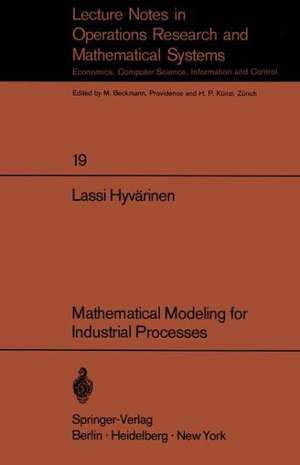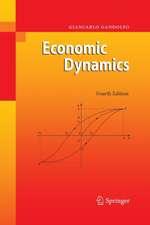Mathematical Modeling for Industrial Processes: Lecture Notes in Economics and Mathematical Systems, cartea 19
Autor L. P. Hyvärinenen Limba Engleză Paperback –
Din seria Lecture Notes in Economics and Mathematical Systems
-
 Preț: 360.02 lei
Preț: 360.02 lei -
 Preț: 383.93 lei
Preț: 383.93 lei -
 Preț: 384.09 lei
Preț: 384.09 lei -
 Preț: 380.07 lei
Preț: 380.07 lei -
 Preț: 446.26 lei
Preț: 446.26 lei -
 Preț: 497.37 lei
Preț: 497.37 lei -
 Preț: 380.84 lei
Preț: 380.84 lei -
 Preț: 384.86 lei
Preț: 384.86 lei -
 Preț: 378.34 lei
Preț: 378.34 lei -
 Preț: 399.67 lei
Preț: 399.67 lei - 20%
 Preț: 360.93 lei
Preț: 360.93 lei - 15%
 Preț: 643.16 lei
Preț: 643.16 lei -
 Preț: 379.09 lei
Preț: 379.09 lei -
 Preț: 404.74 lei
Preț: 404.74 lei -
 Preț: 385.62 lei
Preț: 385.62 lei - 15%
 Preț: 644.49 lei
Preț: 644.49 lei -
 Preț: 379.09 lei
Preț: 379.09 lei -
 Preț: 345.50 lei
Preț: 345.50 lei -
 Preț: 425.80 lei
Preț: 425.80 lei -
 Preț: 378.34 lei
Preț: 378.34 lei - 18%
 Preț: 775.65 lei
Preț: 775.65 lei -
 Preț: 392.60 lei
Preț: 392.60 lei -
 Preț: 401.61 lei
Preț: 401.61 lei - 15%
 Preț: 646.43 lei
Preț: 646.43 lei -
 Preț: 382.18 lei
Preț: 382.18 lei -
 Preț: 378.34 lei
Preț: 378.34 lei - 15%
 Preț: 637.59 lei
Preț: 637.59 lei - 15%
 Preț: 647.27 lei
Preț: 647.27 lei -
 Preț: 377.73 lei
Preț: 377.73 lei -
 Preț: 447.84 lei
Preț: 447.84 lei - 15%
 Preț: 644.49 lei
Preț: 644.49 lei -
 Preț: 386.00 lei
Preț: 386.00 lei - 15%
 Preț: 654.43 lei
Preț: 654.43 lei -
 Preț: 415.02 lei
Preț: 415.02 lei -
 Preț: 411.54 lei
Preț: 411.54 lei -
 Preț: 398.92 lei
Preț: 398.92 lei -
 Preț: 398.92 lei
Preț: 398.92 lei -
 Preț: 392.75 lei
Preț: 392.75 lei - 15%
 Preț: 635.47 lei
Preț: 635.47 lei - 20%
 Preț: 653.56 lei
Preț: 653.56 lei -
 Preț: 379.86 lei
Preț: 379.86 lei -
 Preț: 495.46 lei
Preț: 495.46 lei -
 Preț: 447.99 lei
Preț: 447.99 lei -
 Preț: 378.71 lei
Preț: 378.71 lei - 15%
 Preț: 637.13 lei
Preț: 637.13 lei -
 Preț: 385.84 lei
Preț: 385.84 lei -
 Preț: 378.54 lei
Preț: 378.54 lei - 15%
 Preț: 666.55 lei
Preț: 666.55 lei -
 Preț: 380.07 lei
Preț: 380.07 lei
Preț: 381.00 lei
Nou
Puncte Express: 572
Preț estimativ în valută:
72.91€ • 76.31$ • 60.68£
72.91€ • 76.31$ • 60.68£
Carte tipărită la comandă
Livrare economică 31 martie-14 aprilie
Preluare comenzi: 021 569.72.76
Specificații
ISBN-13: 9783540049432
ISBN-10: 3540049436
Pagini: 136
Ilustrații: VI, 125 p.
Dimensiuni: 178 x 254 x 7 mm
Greutate: 0.25 kg
Ediția:Softcover reprint of the original 1st ed. 1970
Editura: Springer Berlin, Heidelberg
Colecția Springer
Seria Lecture Notes in Economics and Mathematical Systems
Locul publicării:Berlin, Heidelberg, Germany
ISBN-10: 3540049436
Pagini: 136
Ilustrații: VI, 125 p.
Dimensiuni: 178 x 254 x 7 mm
Greutate: 0.25 kg
Ediția:Softcover reprint of the original 1st ed. 1970
Editura: Springer Berlin, Heidelberg
Colecția Springer
Seria Lecture Notes in Economics and Mathematical Systems
Locul publicării:Berlin, Heidelberg, Germany
Public țintă
ResearchCuprins
1. Basic Concepts.- 1.1. Modeling.- 1.2. Classification of Processes.- 1.3. Process Parameters and Variables and their Classification.- 1.4. Classification of Process Models.- Capter 2. Optimizing Models.- 2.1. General Considerations.- 2.2. Objective Function — an Example.- 2.3. Designing the Objective Function.- 2.4. Objective Function as a Function of Time.- 2.5. Constrained and Unconstrained Optima.- 2.6. Objective Function — Example Revisited.- 3. Methods of Optimum Search.- 3.1. Problem Definition.- 3.2. Single Variable Search.- 3.3. Two-dimensional Search (Hill-Climbing).- 4. Design of Experiments.- 4.1. Replication.- 4.2. Blocking of Experiments.- 4.3. Randomization.- 4.4. Factorial Design.- 4.5. Orthogonality.- 4.6. Confounding.- 4.7. Fractional Factorial Design.- 5. Dynamic Covariance Analysis.- 5.1. Dynamic Models.- 5.2. Linear Dynamic Model — Single Variable.- 5.3. End Conditions.- 5.4. Identification of Linear Model.- 5.5. Linear Dynamic Model — Multiple Variables.- 6. Principal Component Analysis.- 6.1. Reducing Number of Variables.- 6.2. Orthogonal Coordinates in Sample Space.- 6.3. Axes with Stationary Property.- 6.4. Zero-one Normalized Variables.- 6.5. Eigenvalues and Eigenvectors.- 6.6. Orthogonality.- 6.7. Mean-square Distances — Distribution of Variance.- 6.8. Numerical Example.- 6.9. Performance Variables.- 7. Regression Analysis.- 7.1. Principle of Least Squares.- 7.2. Linear Regression.- 7.3. Transformation to Linear Form.- 7.4. Choosing the Form of Model.- 7.5. Stepwise Regression.- 7.6. Non-linear Estimation.- References.














